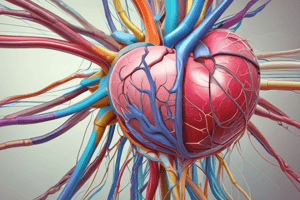Podcast
Questions and Answers
What is the main function of the Parasympathetic Nervous System?
What is the main function of the Parasympathetic Nervous System?
- Activate fight or flight response
- Increase heart rate for alertness
- Decrease heart rate to conserve energy (correct)
- Enhance metabolic activities
Which neurotransmitter is released when the Parasympathetic Nervous System is active?
Which neurotransmitter is released when the Parasympathetic Nervous System is active?
- Epinephrine
- Norepinephrine
- Acetylcholine (correct)
- Dopamine
What effect does prolonged stress have on the autonomic nervous system?
What effect does prolonged stress have on the autonomic nervous system?
- Balances the effects of both systems
- Leads to excessive sympathetic activation (correct)
- Decreases sympathetic activation
- Enhances parasympathetic activation
Which bodily function is NOT promoted by the Parasympathetic Nervous System?
Which bodily function is NOT promoted by the Parasympathetic Nervous System?
What could be a consequence of too much parasympathetic activation?
What could be a consequence of too much parasympathetic activation?
How does the Parasympathetic Nervous System contribute to balance in bodily functions?
How does the Parasympathetic Nervous System contribute to balance in bodily functions?
What is the primary role of the Autonomic Nervous System (ANS)?
What is the primary role of the Autonomic Nervous System (ANS)?
Which branch of the Autonomic Nervous System is activated during times of stress, fear, or excitement?
Which branch of the Autonomic Nervous System is activated during times of stress, fear, or excitement?
What physiological responses occur when the Sympathetic Nervous System (SNS) is activated?
What physiological responses occur when the Sympathetic Nervous System (SNS) is activated?
Which of the following is NOT a function of the Sympathetic Nervous System?
Which of the following is NOT a function of the Sympathetic Nervous System?
What is the role of epinephrine in the body when the Sympathetic Nervous System is active?
What is the role of epinephrine in the body when the Sympathetic Nervous System is active?
What does the Sympathetic Nervous System do to hair follicles in response to cold temperatures?
What does the Sympathetic Nervous System do to hair follicles in response to cold temperatures?
Flashcards are hidden until you start studying
Study Notes
Autonomic Nervous System
The Autonomic Nervous System (ANS) is a part of the peripheral nervous system that controls several internal organs. It plays a critical role in regulating essential bodily functions such as heart rate, blood pressure, digestion, respiration, and even sexual arousal. The ANS is divided into two main branches: the sympathetic nervous system and the parasympathetic nervous system. These branches work together to maintain homeostasis within the body.
Sympathetic Nervous System
The Sympathetic Nervous System (SNS), also known as the "fight or flight" response, prepares the body for physical activity by increasing heart rate, respiration, and dilating bronchioles. This branch is activated during times of stress, fear, or excitement when the body needs more energy. When the SNS is active, it releases epinephrine (adrenaline), which helps increase heart rate and release glucose from liver cells.
Functions of the Sympathetic Nervous System
- Increased heart rate to supply muscles with oxygenated blood.
- Dilation of bronchioles to allow fresh air into the lungs.
- Release of glucose from liver cells to boost energy levels.
- Contraction of pupils to improve visual focus.
- Erection of hair follicles, which can sense cold temperatures.
- Piloerection, causing goosebumps.
Parasympathetic Nervous System
In contrast, the Parasympathetic Nervous System (PNS) or the "rest and digest" response conserves energy by slowing down heart rate and reducing metabolic activities. It is responsible for restoring balance after periods of intense sympathetic activation. When the PNS is active, it releases acetylcholine, which has the opposite effect of epinephrine.
Functions of the Parasympathetic Nervous System
- Decreases heart rate to conserve energy.
- Slows down breathing.
- Promotes glandular secretions for digestion and metabolism.
- Facilitates defecation and urination.
- Supports reproductive activities.
Balance Between the Two Systems
While both systems have distinct roles, their effects must be balanced for normal functioning. For example, prolonged stress can lead to excessive sympathetic activation, which may cause anxiety, cardiovascular disease, or other health issues. On the other hand, too much parasympathetic activation can result in poor sleep quality and reduced alertness. A healthy balance between these two branches ensures proper regulation of bodily functions and overall wellbeing.
Studying That Suits You
Use AI to generate personalized quizzes and flashcards to suit your learning preferences.




